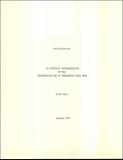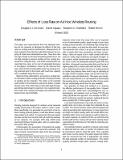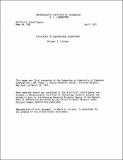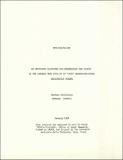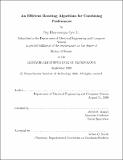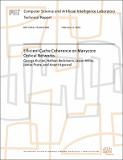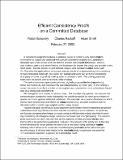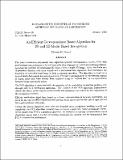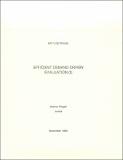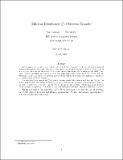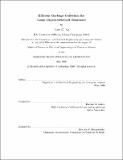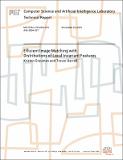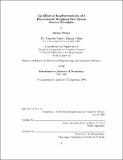Browsing Computer Science and Artificial Intelligence Lab (CSAIL) by Title
Now showing items 1035-1054 of 3804
-
An Effective Representation of the Reachability Set of Persistent Petri Nets
(1981-01)In a persistent Petri net, an enabled transition can become disabled only by firing itself. Here, an algorithm is presented which constructs a semilinear representation of the set of states reachable in an arbitrary ... -
Effectiveness
(1978-07)Church's thesis equates the intuitive notion "effective" with the mathematical notion "recursive." In order for this thesis to provide any information to us we have to have a clear understanding of both notions. We consider ... -
Effects of Loss Rate on Ad Hoc Wireless Routing
(2002-03)This paper uses measurements from two deployed wireless ad hoc networks to illustrate the effects of link loss rates on routing protocol performance. Measurements of these networks show that the radio links between the ... -
Efficiency of Equivalence Algorithms
(1972-04-01)This paper was first presented at the Symposium on Complexity of Computer Computations, IBM Thomas J. Watson Research Center, Yorktown Heights, New York, on March 22, 1972. The equivalence problem is to determine the ... -
An Efficient Algorithm for Determine the Length of the Longest Dead Path in an "LIFO" Branch-and-bound Exploration Schema
(1980-01)The length of the longest dead path (LLDP) is a widely used parameter in estimating the efficiency of branch-and-bound optimization algorithms that employ the LIFO exploration schema. Thanks to two original theorems, we ... -
Efficient At-most-once Messages Based on Synchronized Clocks
(1990-04)This paper describes a new message passing protocol that provides guaranteed detection of duplicate messages even when the receiver has no state stored for the sender. -
An Efficient Boosting Algorithm for Combining Preferences
(1999-08)The problem of combining preferences arises in several applications, such as combining the results of di_x000B_erent search engines. This work describes an effcient algorithm for combining multiple preferences. We _x000C_rst ... -
Efficient Cache Coherence on Manycore Optical Networks
(2010-02-11)Ever since industry has turned to parallelism instead of frequency scaling to improve processor performance, multicore processors have continued to scale to larger and larger numbers of cores. Some believe that multicores ... -
Efficient Consistency Proofs on a Committed Database
(2003-02)A consistent query protocol allows a database owner to publish a very short string c which commits her to a particular database D with special consistency property (i.e., given c, every allowable query has unique and ... -
An Efficient Correspondence Based Algorithm for 2D and 3D Model Based Recognition
(1990-10-01)A polynomial time algorithm (pruned correspondence search, PCS) with good average case performance for solving a wide class of geometric maximal matching problems, including the problem of recognizing 3D objects from ... -
Efficient Demand-Driven Evaluation (I)
(1983-09)We describe a program transformation technique for programs in a general stream language L whereby a data-driven evaluation of the transformed program performs exactly the same computation as a demand-driven evaluation of ... -
Efficient Demand-Driven Evaluation (II)
(1983-09)In Part I of this paper, we presented a scheme whereby a compiler could propogate demands through programs in a powerful stream language L. A data-driven evaluation of the transformed program performed exactly the same ... -
An Efficient Fill Estimation Algorithm for Sparse Matrices and Tensors in Blocked Formats
(2017-06-09)Tensors, linear-algebraic extensions of matrices in arbitrary dimensions, have numerous applications in computer science and computational science. Many tensors are sparse, containing more than 90% zero entries. Efficient ... -
Efficient Garbage Collection for Large Object-Oriented Databases
(1996-05)This thesis presents the design of an efficient garbage collection scheme for large, persistent object-oriented databases in a client-server environment. The scheme uses a partitioned approach. A database is divided into ... -
Efficient Image Matching with Distributions of Local Invariant Features
(2004-11-22)Sets of local features that are invariant to common image transformations are an effective representation to use when comparing images; current methods typically judge feature sets' similarity via a voting scheme (which ... -
An Efficient Implementation of A Hierarchical Weighted Fair Queue Packet Scheduler
(1994-05)The technical developments in computer networks in recent years have spawned the possibility of merging different services into a single Integrated Service Packet Network (ISPN). The types of service quality required by ... -
Efficient Implementation of Applicative Languages
(1984-04)The analysis of parallelism in an applicative program is much easier than in a program written in a conventional statement-oriented style. This makes it possible for an optimizing compiler to prepare such a program for ... -
Efficient Implementation of High-Level Languages on User-Level Communications Architectures
(1994-05)User-level communication architectures --- parallel architectures that give user code direct but protected access to the network --- provide communication performance that is an order of magnitude higher than previous-generation ...

